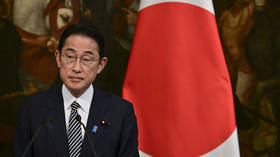Japan comments on Russian oil ban

Japanese Prime Minister Fumio Kishida has said that phasing out reliance on Russian oil will take time, as Tokyo will do its best to “minimize” the negative impact on businesses and the average person. The comments were made just after the Group of Seven (G7) agreed to target oil imports from Russia as part of sanctions over the military campaign in Ukraine.
The G7 comprises the US, Canada, Britain, France, Germany, Italy, and Japan.
“For a country heavily dependent on energy imports, it’s a very difficult decision. But G7 coordination is most important at a time like now,” Kishida told reporters on Monday.
“As for the timing of the reduction or stoppage of [Russian] oil imports, we will consider it while gauging the actual situation,” he added. “We will take our time to take steps towards a phase-out.”
The prime minister said Tokyo will “minimize the adverse effects” of the phase-out on businesses and ordinary people.
A country with scarce resources, Japan imports Russian crude oil to diversify its supply sources. Russia accounted for 3.6% of Japanese oil imports in 2021, according to Kyodo News.
During a virtual meeting on Sunday, the G7 nations agreed to phase out or ban Russian oil. The move came after the EU proposed this week to do away with oil imports from Moscow by the end of this year.
The European bloc’s plan, however, was reportedly later revised in order to allow Hungary and Slovakia to phase out Russian oil by the end of 2024, and the Czech Republic by the end of June of that year.
Hungary, whose economy is heavily reliant on energy from Russia, repeatedly said it would use its veto power to block an immediate ban on Russian oil and gas.
Many countries, including NATO member states, have imposed sweeping sanctions on Russia, hitting its banks and freezing assets abroad, among other measures.
Russia attacked the neighboring state in late February, following Ukraine’s failure to implement the terms of the Minsk agreements, first signed in 2014, and Moscow’s eventual recognition of the Donbass republics of Donetsk and Lugansk. The German and French brokered protocols were designed to give the breakaway regions special status within the Ukrainian state.
The Kremlin has since demanded that Ukraine officially declare itself a neutral country that will never join the US-led NATO military bloc. Kiev insists the Russian offensive was completely unprovoked and has denied claims it was planning to retake the two republics by force.













